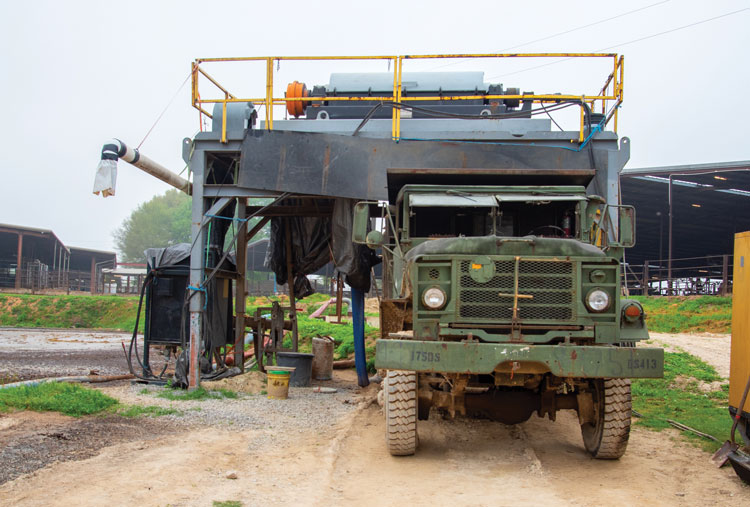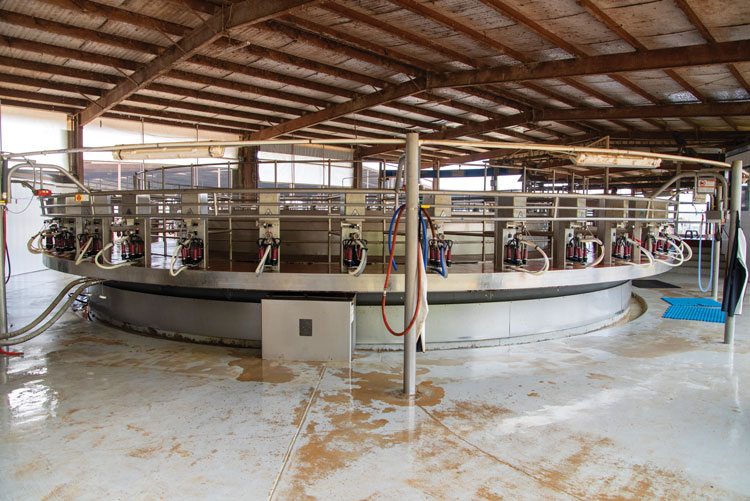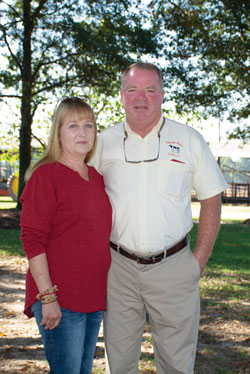
Not all that glitters is gold, and not all that has worth sparkles or shines.
Louisiana dairyman Brent Duncan considers manure to be “a diamond in the rough.” Manure has always played a key role on his farm in terms of fertilizing crops, but an investment in manure processing technology helped him add a little polish to that plentiful resource.
Duncan is a third-generation dairy farmer. His parents, Ray and Neta Duncan, still live on the farm and have enjoyed watching their son and his wife, Laurie, grow the business since they took over operations in 1989.
Just a mile from the Mississippi state line, their location in the Deep South faces extreme heat. Just days before our conversation, they were dealing with a 115°F heat index, and heat indexes over 100°F are the norm for their summers. Duncan noted that relief from the hot conditions typically doesn’t come until mid-October.
To keep animals cool, they ensure all fans are running in the barns. They offer shade in the pastures for heifers and cows, and they make certain all waterers are clean. Still, the hot weather is hard on the cattle, and milk production often drops 10 to 12 pounds per cow per day during these heat waves.
“You have to go with the flow and do the best you can,” Duncan said.
Duncan grew up with his parents and siblings on the farm, spending many hours milking with his mom in their small flat barn parlor. The farm has grown from the 80 cows they were milking in the 1980s to between 500 and 600 lactating cows today. With an excellent calf program headed up by Laurie and the use of sexed semen, the Duncans have plenty of heifers, but encroachment from growing cities nearby puts a limit on how big their herd can be. Instead of milking more cows, they cull heavily, replacing the older cows with 2-year-olds.
Willing to invest
Duncan said his philosophy has always been to invest in the dairy. At one point, they were milking 600 cows in a 32-stall flat barn parlor, a system that worked for the cows but burnt out their employees. On a trip to California, a rotary parlor caught Duncan’s attention, and he told Laurie that was what they needed.
In 2013, they installed a 40-stall rotary, the first rotary parlor in the state. Today, cows are milked twice a day, and the Duncans maintain excellent milk quality, with an average herd somatic cell count around 150,000 cells/mL, sitting below the national average.
Technology in the parlor records daily milk production. The cows also wear neck collars with monitors that track activity. Cows can be diverted electronically using a sort gate and are bred in the old flat barn parlor. For the most part, heat detection is based on activity levels, and Duncan said the animal tracking system is “worth a million bucks right there.”
The lactating cows are housed in three barns, with stalls that are bedded with sand. Cows also spend time on pasture.
Their herd is certified organic, and the Duncans have been shipping organic milk to a major grocer in the Southeast for more than 15 years. That transition was, interestingly enough, initiated by the use of poultry litter. A friend of Duncan’s put up several poultry houses, as did a few other farms in the area. Duncan began using the litter to fertilize fields where he was planting rye and pearl millet to graze and greenchop. Since they were already grazing, his friend suggested he look into organic milk production. Duncan said he wasn’t using antibiotics on his cows anyway, so he followed his friend’s advice. Their first load of organic milk was sold in 2007, and Duncan said he is extremely satisfied with the decision to go this route.
Nothing better than manure
Using manure as a nutrient source is something Duncan is passionate about.
“We are taking a product we have and utilizing it. Nothing grows crops better than manure. Nothing works better,” he stated.
The Duncans manage 1,300 acres of owned and rented cropland and pastureland. They do all their own fieldwork, including liquid and solid manure application.
Manure from the cows is scraped out of the barns and stored in a lagoon. Duncan had tried his hand at composting in the past, but he found the manure to be too wet to dry down in a reasonable time frame. He wasn’t sure exactly what he was looking for, but he wanted something more to add to their manure system and started looking into options.
A window of opportunity came in the form of a phone call from Jason Edwards, who at the time worked for an oil field solids control company. When the oil business crashed in 2020, that business was looking to get into the environmental side of things and transition into working with dairy farmers wanting to separate solids from manure.
Based in Colorado, they had their eyes set on installing equipment on farms in the Southeast. A cold call to Duncan turned out to be a perfect match. After Duncan heard their initial pitch, he told Edwards, “I’ve been looking for someone like you.”
After the installation, manure from their lagoon now goes through a dredge to sort out the biggest solids, then through a screen, and then to the centrifuge manufactured by Kayden Industries, the company where Edwards now works. It spins and further separates the solids from the liquid.

The centrifuge is located on a platform so a dump truck can be placed underneath it to catch the material. Duncan said this makes the system more efficient, eliminating the need for someone to load those solids into the truck.
The dump truck hauls the solids out to the field where they create windrows, turning them to aid in the composting process. These solids are eventually distributed onto the crop fields using a poultry litter spreader.
Some of the solids are also sold to locals who utilize them as a fertilizer source in their gardens. The farm is simply selling by word of mouth right now, but Duncan is considering other options for packaging their product.

The benefits of the manure solids are apparent to Duncan. Using these solids on their fields “makes a world of difference,” he said. “It does an excellent job, and it is all the nutrients you need.” He has found that fields that used to yield two cuttings of hay are now able to produce three or four cuttings.
They also use the solids on the alleyway floors in their barns to help prevent slipping. They used to purchase sawdust for this purpose, but Duncan said they can now make use of this product they already have.
As for the liquid that comes out of the centrifuge, it is either pumped back into the lagoon until it is time for application or put directly into their 4,000-gallon tanker and applied to the land. This nutrient-filled water is applied to pastures and hayfields three to four times a year. Duncan said that with the solids removed, it really penetrates the soil, getting the nutrients down where the plants need them.
Maintaining a closed loop
Duncan was inspired to do more with manure because he didn’t like seeing any of it go to waste. “I wanted to capture and utilize it,” he said. He feels the centrifuge speeds up the composting process, making it much quicker and more efficient to use the manure as fertilizer. The system also allows them to process manure as soon as it leaves the barn.
He takes pride in the fact that their farm is a closed loop. All feed grown on the farm is fed to their animals, and the cows turn that feed into milk. Heifers raised will someday fill the milking stalls. Manure produced by their animals is used as fertilizer, which they apply to their cropland and pastures as an investment in future soil health. It’s a simple model of sustainability.
However, from the rotary parlor to the centrifuge, Duncan has not shied away from bringing technology to his farm that is uncommon in that part of the country. He is the only dairy in Louisiana to milk with a rotary parlor, and as far he knows, he’s the only farm utilizing a centrifuge system in that region.
“I’m always thinking outside the box,” he said. “I have always tried to be innovative and look for better opportunities.”
Duncan acknowledged that the centrifuge, compost turner, and new manure pump were expensive, but he is pleased with the product he receives in return.
“I invested quite a bit in the system,” he said, “but it was absolutely worth it.” For Duncan and many other livestock farmers, a commitment to proper manure management and further processing helps this valuable nutrient source shine a little brighter.









